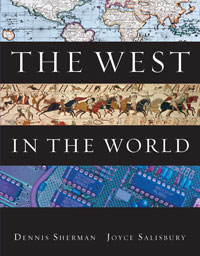 
The West in the World, 4th Edition (Sherman)Chapter 16:
Overturning the Political and Social OrderCritical Thinking Questions- "A Great Ferment:" Trouble Brewing in France
- Why were the social orders of France discontented with the monarchy?
- How did the French taxation system contribute to the financial crisis which crippled the monarchy?
- Why did French nobles refuse to give in to the king's appeals for financial reform?
- How had the French middle class changed during the eighteenth century? As a result, how did they feel about their position in the French political and social order?
- In what specific ways did the end of France's long period of prosperity trigger unrest?
- How did the Third Estate resolve the deadlock over voting procedure in the Estates General? In which estate's favor was the issue resolved?
- How did the French people—both the Parisian populace and the peasantry—help to turn the course of events toward a more radical outcome?
- In what ways did women participate in bringing down the French old regime?
- The Constitutional Monarchy: Establishing a New Order
- What types of reforms were enacted once the central government had become a constitutional monarchy?
- How did the Western states react to the French Revolution? Why was there such a wide range of reactions?
- To the Radical Republic and Back
- After 1791, which groups in French society were still dissatisfied by the governmental reforms? What more did they want?
- Which groups in France initially saw war as a "solution"? Were their expectations fulfilled?
- After the execution of King Louis XVI, what internal and external threats challenged the Republic?
- How did the sans-culottes push the revolutionary leaders to take more radical actions?
- What was the purpose of the Reign of Terror?
- In what ways did radical revolutionary leaders attempt to assault institutions connected to the old regime?
- How did the Republic's leaders try to use revolutionary symbols to increase support and patriotism for the regime and its ideals?
- What other peoples were inspired by the French revolution to attempt to achieve independence?
- Describe the changes that took place in government and everyday life after the bourgeoisie took over and implemented the "White" terror.
- Napoleon Bonaparte
- What steps did Napoleon take to advance his career? Consider the trajectory of his career that culminated in the coup d'état that overthrew the Directory.
- How did Napoleon end the democratization France had enjoyed under the Republic?
- Why do you think Napoleon needed to engage in military conquest, even after being crowned emperor?
- How did Napoleon's military and economic strategy toward Great Britain differ from that toward the European continent?
- Describe how Napoleon's military conquests changed both the map of and the political balance of power in Europe—that is, describe the "new European order."
- What reforms and Enlightenment ideals did Napoleon bring to European governments that came under direct or indirect French control? What influence did the Napoleonic Code have on these governments?
- In what ways did Napoleon's conquest in Europe affect Latin America?
- What three major weaknesses together contributed to diluting Napoleon's power between 1808 and 1812?
- What overseas actions did Great Britain take in response to Napoleon's military actions in Europe?
- How did Napoleonic rule provoke a new national spirit among subject peoples, such as the Spanish.
- How did the invasion of Russia debilitate Napoleon's fighting forces?
 |  |
|





